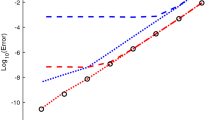Abstract
The computational uncertainty principle (CUP) is applied to explain the experimental formulae of the critical time of decoupling for Lorenz equations (LEs). We apply the multiple precision (MP) library in obtaining the long-time solution of LEs, and based on the classic Taylor scheme, we developed a high-performance parallel Taylor solver to do the computation. The new solver is several hundreds times faster than the reported solvers developed in MATHEMATICA software, and it has the ability to yield longer solutions of LEs, up to t ∼ 104 LTU (Lorenz time unit). Further, we notice that the two computation processes with different precisions or orders will produce the reliable correct reference solutions before they have a significant difference. According to this property we propose an approach for maintaining the correct numerical solution. The new solver and the solution validation approach are used to identify and correct an erroneous solution reported in a previous study.
Similar content being viewed by others
References
Lorenz, E.N.: Deterministic nonperiodic flow. J. Atmos. Sci. 20, 130–141 (1963)
Teixeira, J., Reynolds, C.A., Judd, K.: Time step sensitivity of nonlinear ntmospheric models: numerical convergence, truncation error growth, and ensemble design. J. Atmos. Sci. 64, 175–189 (2007)
Yao, L.S., Hughes, D.: Comments on “time step sensitivity of nonlinear atmospheric models: numerical convergence, truncation error growth, and ensemble design.” J. Atmos. Sci. 65, 681–682 (2008)
Liao, S.J.: On the reliability of computed chaotic solutions of non-linear differential equations. Tellus 61A, 550–564 (2009)
Li, J.P., Zeng, Q.C., Chou, J.F.: Computational uncertainty principle in nonlinear ordinary differential equations—I. Numerical results. Sci. China (Series E) 43, 449–461 (2000)
Li, J.P., Zeng, Q.C., Chou, J.F.: Computational uncertainty principle in nonlinear ordinary differential equations—II. Theoretical analysis. Sci. China (Series E) 44, 55–74 (2001)
Liz, J.P.: Computational uncertainty principle: meaning and implication. Bull. Chin. Acad. Sci. 15, 428–430 (2000)
Hu, S.J., Chou, J.F.: Uncertainty of the numerical solution of a nonlinear system’s long-term behavior and global convergence of the numerical pattern. Adv. Atmos. Sci. 21, 767–774 (2004)
Li, J.P., Chou, J.F.: The global analysis theory of climate system and its applications. Chin. Sci. Bull. 48, 1034–1039 (2003)
Li, J.P., Wang, S.: Some mathematical and numerical issues in geophysical fluid dynamics and climate dynamics. Commun. Comput. Phys. 3, 759–793 (2008)
Wang, P.F., Huang, G., Wang, Z.Z.: Analysis and application of multiple precision computation and round-off error for nonlinear dynamical systems. Adv. Atmos. Sci. 23, 758–766 (2006)
Henrici, P.: Error Propagation for Difference Methods. Wiley, New York (1963)
Cao, J., Wang, P.F.: Study on the effective computation time for numerical nonlinear ordinary differential equations. (2011, in press)
Oyanarte, P.: MP—a multiple precision package. Comput. Phys. Commun. 59, 345–358 (1990)
Lorenz, E.N.: Computational periodicity as observed in a simple system. Tellus 58A, 549–557 (2006)
Author information
Authors and Affiliations
Corresponding author
Rights and permissions
About this article
Cite this article
Wang, P., Li, J. & Li, Q. Computational uncertainty and the application of a high-performance multiple precision scheme to obtaining the correct reference solution of Lorenz equations. Numer Algor 59, 147–159 (2012). https://doi.org/10.1007/s11075-011-9481-6
Received:
Accepted:
Published:
Issue Date:
DOI: https://doi.org/10.1007/s11075-011-9481-6




